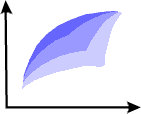Efficient Frontier

William J. Bernstein
Efficient Frontier

William J. Bernstein
![]()
The Studio 54 Market Hypothesis
Robert Shiller is no new era enthusiast. In Irrational Exuberance he takes the reader on a scholarly tour of the excesses of the millennial capital markets. Much of the book is spent attempting to reconcile the current madness of crowds with the efficient market hypothesis (EMH).
Distilled to its essence, the EMH states that the price of a security is the sum of all public information about it. (And in its "strong form," all private information also.) Unless you are in possession of new information your estimate of its price is not likely to be more accurate than the market's, and you are thus unlikely to earn an excess return trading it.
But what if the trading environment itself goes barking mad from time to time? If the markets are so rational, then how do you explain eToys, a firm which right before it fell off a cliff had $6 billion in capitalization, $30 million in sales, and a hoard of hungry competitors, not the least of which is Toys "R" Us? An intellectually honest EMH true believer trying to rationalize this security’s behavior bears a strong resemblance to a Christian Scientist with appendicitis.
Shiller's model is similar to the EMH, with one important difference. He admits that a stock price is the sum of all public knowledge about it, but that this knowledge is incomplete. Consider, he says, two new restaurants on the same street. It is 5 PM, and both have just opened for dinner. The first customer, having no idea how good the cuisine is in either establishment, examines the menu and the facilities of both, and makes a decision that is only imperfectly informed. She picks Restaurant A. Others make the same uninformed, and essentially random sort of decision, and purely by chance at 6 PM there are now several diners in restaurant A, but only one in restaurant B. The fate of each establishment for the evening is now sealed; successive diners will conclude that because it is more crowded, restaurant A must be superior to restaurant B. The latter will remain empty. This phenomenon is familiar to anyone who has been to Paris. One season, for no good reason, a given certain café will be jammed every evening, whereas the café opposite will remain empty. The next season, the two cafés' fortunes reverse.
Club goers of a certain age may remember Studio 54 in Manhattan. In the late 1970s this establishment, fueled by celebrity, sex, but most of all, cocaine, was the place to be seen. Only the elite were allowed past the bouncer, and would-be entrants literally died attempting to pass its doors. It remained packed and profitable until the moment an IRS raid turned up stacked boxes of drugs and undeclared cash.
How can the markets become so irrational? Shiller cites psychological experiments in which subjects are asked to perform simple quantitative tasks, such as measuring the length of a line, or counting the number of x's on a sheet of paper. When asked to accomplish such tasks alone, subjects perform them quite accurately. However, when done in the presence of other people (who unknown to the subjects are in league with the investigators) who intentionally demonstrate to the subjects the wrong answer, they are quite likely to provide the same wrong answer themselves. The applicability of this paradigm to the capital markets should be obvious.
Shiller is brutal about the quantitative abilities of the average investor, who is unlikely to be either willing or able to perform even the most rudimentary kind of security analysis. As the century turns one can imagine them roaming the streets of our fictional city block. They find the stock café jammed with happy, noisy diners; the bond, cash, and real estate cafes nearly empty; and the investment equivalent of Studio 54—the internet and tech markets—a frenzied mob. One should not be surprised if mistakes are made.
Copyright © 2000, William J. Bernstein. All rights reserved.